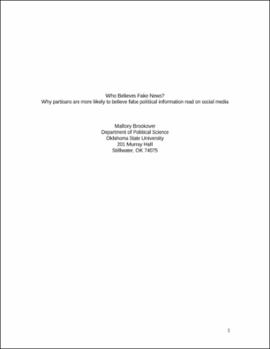| dc.contributor.author | Brookover, Mallory | |
| dc.date.accessioned | 2021-04-20T13:37:29Z | |
| dc.date.available | 2021-04-20T13:37:29Z | |
| dc.date.issued | 2019-11-15 | |
| dc.identifier | oksd_brookover_HT_2019 | |
| dc.identifier.uri | https://hdl.handle.net/11244/329405 | |
| dc.description.abstract | As people increasingly receive their news via social media in the Internet age, some political scientists have begun to examine which factors cause seemingly intelligent individuals to believe false political information. Because Facebook and other social media sites have been hesitant to dedicate enough resources to have effective filtering, fact-checking, or editorial judgment, they allow fake news to spread unrestrainedly. In my project, I discuss the cognitive and situational factors that lead people to believe fake news. By administering a survey analyzing people’s ability to assess the veracity of political advertisements, I find that strong political partisans are far less likely to critically consume political information on social media than weak partisans or independents. | |
| dc.format | application/pdf | |
| dc.language | en_US | |
| dc.rights | Copyright is held by the author who has granted the Oklahoma State University Library the non-exclusive right to share this material in its institutional repository. Contact Digital Library Services at lib-dls@okstate.edu or 405-744-9161 for the permission policy on the use, reproduction or distribution of this material. | |
| dc.title | Who believes fake news? Why partisans are more likely to believe false political information read on social media | |
| osu.filename | oksd_brookover_HT_2019.pdf | |
| dc.type.genre | Honors Thesis | |
| dc.type.material | Text | |
| dc.contributor.director | Hansen, Holley | |
| dc.contributor.facultyreader | Motta, Matthew | |
| thesis.degree.discipline | Political Science | |
| thesis.degree.grantor | Oklahoma State University | |
